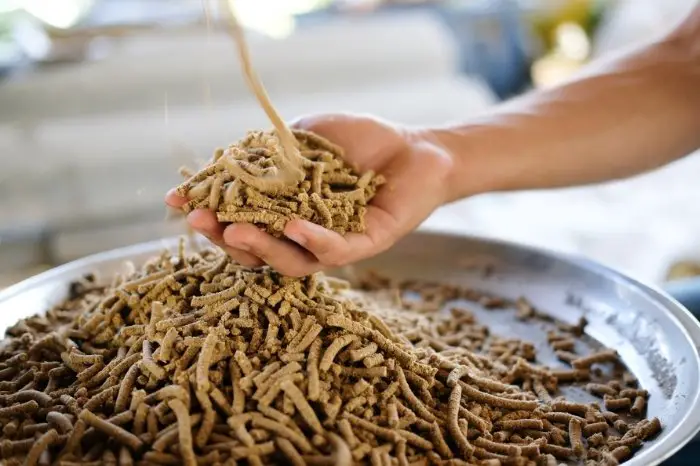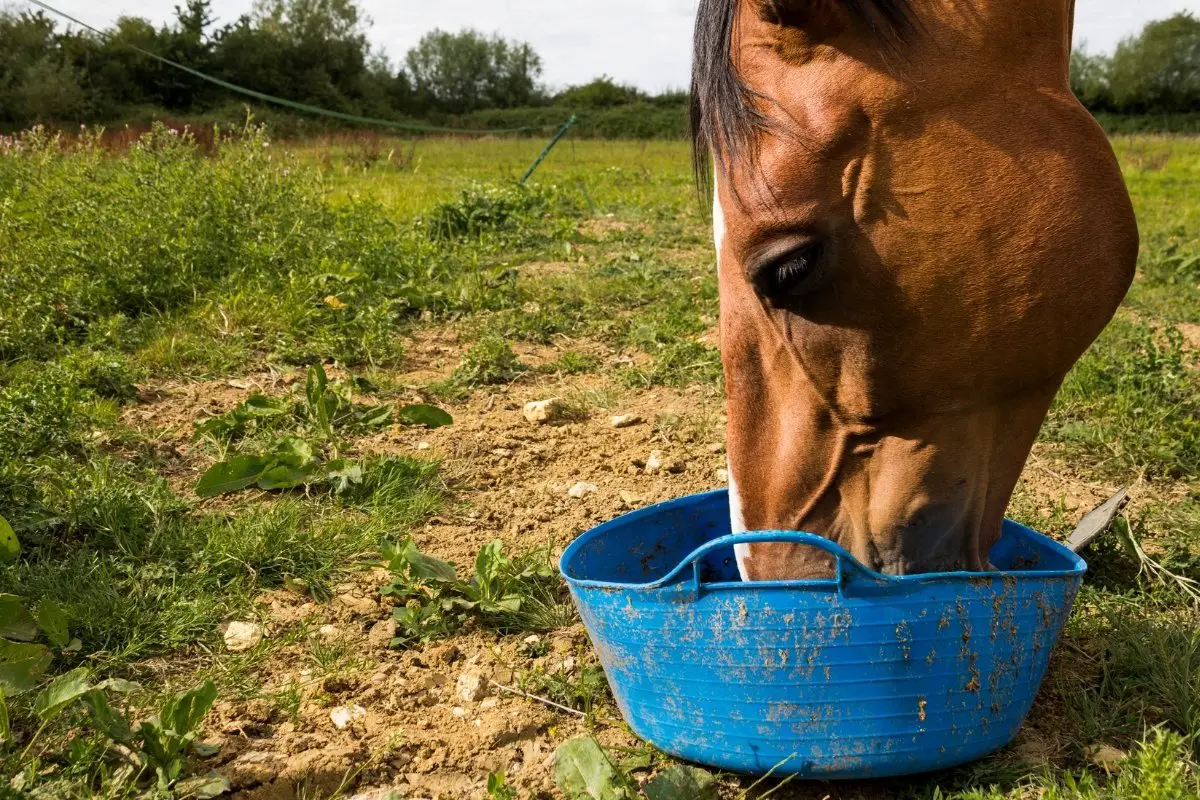Last Updated on May 16, 2022 by Fabiola L.
Horses may require a low starch diet for a range of reasons. Let’s find out more with our low starch horse feed comparison!
What Is Starch In Horse Feed?
Starch is a form of sugar that is found in the cells of plants. They are part of a group of nutrients called carbohydrates, that provide energy to the horse when eaten.
Another form of carbohydrate eaten by horses is fiber. The difference between starch and fiber is that the former is a nonstructural carbohydrate, whilst fiber is a structural carbohydrate. This affects how the energy is broken down and metabolized by the body.

When food containing starch is eaten by the horse, they are broken down into tiny sugar molecules which can be easily absorbed into the bloodstream. These sugars turn into glucose, which is distributed around the body for use as energy.
This system is controlled by a complex hormonal feedback mechanism, and the main hormone responsible for controlling glucose levels is insulin. If the horse does not need to immediately use all the glucose produced from eating starch, insulin will regulate the amount of glucose in the bloodstream.
Check Out How Much Weight Can A Horse Carry On Its Back?
Why Do Horses Need A Low Starch Diet?
A high-starch diet is not natural for a horse and is very different from what they would eat in the wild. The horse is primarily adapted to get most of its energy from fiber, with a small amount of starch and sugar. These components are normally added to the horse’s diet to meet their energy requirements when they are in hard work.
There are certain medical problems we encounter in horses that mean they require a low starch diet:
-
Insulin Resistance
Insulin resistance occurs when there is a failure of the feedback mechanism that regulates blood glucose levels in the horse. When a horse consumes a starchy meal, the blood glucose levels are regulated by insulin. In a horse with insulin resistance, the blood glucose levels remain too high, which can cause obesity, laminitis, and other health problems.

-
Excitability – Low Starch Horse Feed Comparison
When starch is digested by the horse, glucose in the blood can pass through the blood-brain barrier. This leads to a state of heightened awareness or excitability – often referred to as ‘fizziness’. In some horses, such as elite sports horses, this may be an advantage, but in the majority of horses, the aim is to reduce excitability by feeding a low-starch diet.
Read more about Why Do Horses Chew On Wood? Weird Horse Habits Revealed!
-
Muscular Problems
Horses with genetic muscular disorders such as polysaccharide storage myopathy or recurrent exertional rhabdomyolysis should not be fed a high-starch diet.
-
Digestive Problems
Large amounts of starch can upset the delicate balance of digestive enzymes and bacteria in the digestive tract. This can cause problems such as gastric ulcers and hindgut acidosis.
Low Starch Horse Feed Comparison
If you are looking to feed your horse a low starch diet, what are the best feeds to use? A low starch horse feed comparison can be very useful, as many horses feeds now claim to be low starch.
When starch is removed from the feed, this will need to be replaced by an alternative energy source. The amount of energy your horse needs should be carefully calculated based on his workload and body weight.
Purina Animal Nutrition Purina Wellsolve Low Starch Pellet
Good energy sources for horses on a low-starch diet include fiber and fats. Fiber can be provided in the form of beet pulp, alfalfa meal, and soyhulls. Fat can be added to feed by using vegetable oil, flax seeds, and soybeans.
A popular ingredient in low-starch diets for horses is rice bran, as it is high in both fat and fiber.
Click Here to Get Info About
Feeds To Avoid For Horses On A Low Starch Diet
The main culprit for starch in horse feed is cereal grains. These are very high in starch and give a big boost of glucose when consumed by the horse.
Traditionally, cereal grains were fed to horses as an energy source. This would often lead to excitable behavior, as a large amount of glucose was released into the bloodstream.
Modern-day feeds tend to include a lower amount of cereal grains, and these are balanced with other energy sources including fiber and fat. If a horse is in hard work, it may be necessary to feed a cereal-based diet to meet the energy requirements during exercise.
Low Starch Horse Feed Comparison Summary
So, as we have learned in our low starch horse feed comparison, horses may need to be fed a low starch diet because of a range of medical problems. These include metabolic disorders such as insulin resistance and gastrointestinal issues such as gastric ulcers. Low starch feeds normally contain little or no cereal grains, and it may be necessary to provide an alternative energy source to the horse.
We’d love to hear your thoughts on our low starch horse feed comparison list! Do you struggle to find a low starch feed that your horse enjoys eating? Or maybe you find it difficult to keep weight on your horse when he is fed a low starch diet? Leave a comment below and we’ll get back to you!
FAQ’s
What Does Low Starch Do For Horses?
Low starch diets are fed to horses that cannot eat a high starch diet. This may be because they have a metabolic problem, or they are unable to digest high starch diets.
Why Is Low Starch Good For Horses?
Low starch feed is good for horses that have a range of medical problems, including gastric ulcers and insulin resistance. However, it is important that the entire diet of the horse is assessed to ensure all of the nutritional needs are being met.
What Horse Feed Is Low In Starch?
Low starch horse feeds are normally ones which do not contain high amounts of cereal grain. Energy in these feeds is provided by other ingredients such as rice bran or beet pulp.
How Much Starch Is Too Much In Horse Feed?
It is impossible to define how much starch is too much in horse feed, as this depends on the nutritional requirements of the horse. Some horses need very little starch in their feed, while others will not be able to maintain their weight unless they are fed a feed containing high levels of starch.
Read more about Creep Feed For Horses! – How & When?

